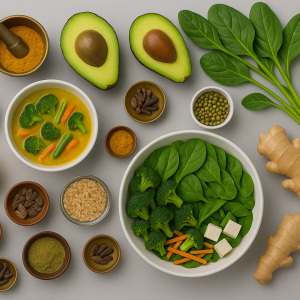What Is Emotional Eating in Ayurveda? (Prajnaparadha)
Ayurveda refers to emotional eating as a result of Prajnaparadha—the “crime against wisdom” or the mistake of the intellect. It means knowingly acting against what’s good for you. This occurs when we eat not out of genuine hunger but as a coping mechanism to fill a void created by unprocessed emotions like stress, grief, anxiety, or boredom.
In such moments, food becomes a substitute for emotional resolution. The body may not need nourishment, but the mind demands distraction or comfort.
Ayurveda treats emotional eating as both a mental and digestive disturbance, often leading to Ama (toxins) and aggravation of Kapha or Vata dosha, depending on the pattern.
Symptoms of Mind-Driven Hunger vs. Body Hunger
| Symptom | True Hunger (Body) | Emotional Hunger (Mind) |
|---|---|---|
| Arises | Gradually | Suddenly |
| Satisfaction after eating | Achieved with moderate intake | Still unsatisfied after eating |
| Craving specific foods | No | Yes – often sugar, fried, salty |
| Timing | Regular intervals | Random times, often late night |
| Sensation | Stomach feels empty | Mind feels restless or heavy |
| Aftermath | Energy and clarity | Guilt, bloating, lethargy |
How Emotions Like Stress, Boredom, and Loneliness Trigger Food Cravings
Each dosha responds to emotions differently—and often, this reflects in eating habits:
- Vata (air-dominant): Under stress or anxiety, Vata types often skip meals, eat erratically, or reach for crunchy, dry snacks for stimulation.
- Pitta (fire-dominant): Intense emotions like anger or pressure can drive Pittas toward spicy or heavy foods or overeating as a form of control.
- Kapha (earth-water dominant): Feelings of sadness, inertia, or boredom may lead to comfort eating, particularly of sweet or fried foods that reinforce heaviness.
Over time, these responses turn into habits that further disrupt Agni (digestion), leading to weight gain, mental fog, and emotional dullness.
Mindful Eating Practices (Rituals, Silence, Chewing, Gratitude)
To restore awareness around food, Ayurveda recommends turning meals into a healing ritual, not a hurried habit. These practices help reset your emotional and digestive rhythms:
Pre-Meal Rituals
- ✓Wash hands and face
- ✓Take three deep breaths
- ✓Express gratitude or say a prayer
During the Meal
- ✓Eat in silence or soft music
- ✓Sit cross-legged or upright
- ✓Chew each bite 20–30 times
- ✓Focus on flavor, texture, aroma
- ✓Avoid screens or multitasking
Post-Meal Reflection
- ✓Notice how you feel
- ✓Note cravings or urges
- ✓Journal any emotions that arise
Herbal Teas and Adaptogens for Emotional Balance
Certain herbs support both mental clarity and digestive balance, making them powerful allies against emotional eating.
Top Herbal Teas
- Ashwagandha – Restores nervous system, ideal for Vata stress-eaters
- Brahmi – Sharpens focus and reduces anxiety-induced cravings
- Shankhpushpi – Soothes emotional turbulence
- Triphala – Gently clears the gut, supports balanced digestion
Ayurvedic Adaptogens
- Ashwagandha – Restores nervous system, ideal for Vata stress-eaters
- Brahmi – Sharpens focus and reduces anxiety-induced cravings
- Shankhpushpi – Soothes emotional turbulence
- Triphala – Gently clears the gut, supports balanced digestion
Conclusion: The Mind Eats First
Ayurveda reminds us that digestion begins not in the mouth, but in the mind. By addressing the emotional patterns beneath your cravings, you return to a place of wisdom, not willpower.



























